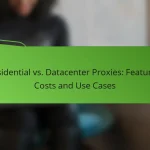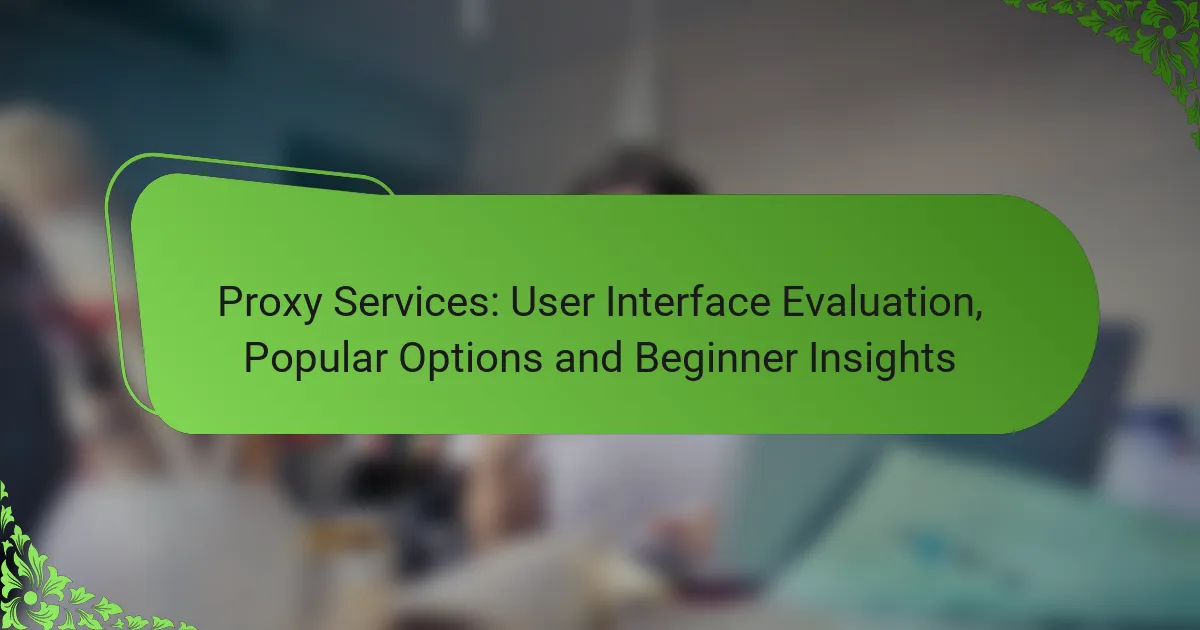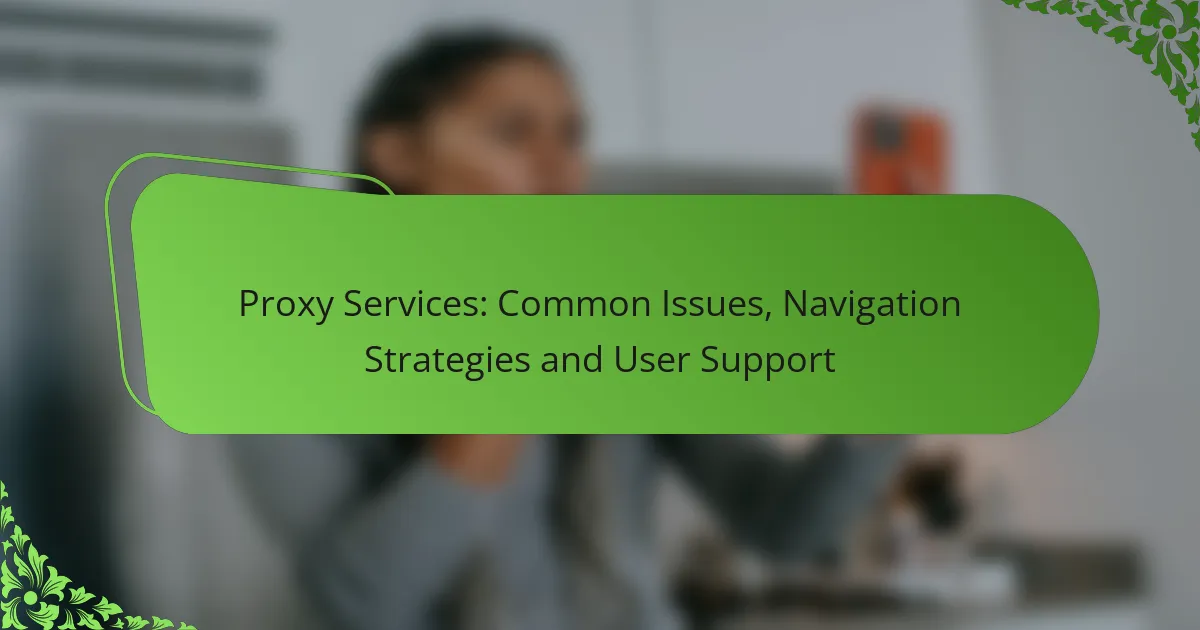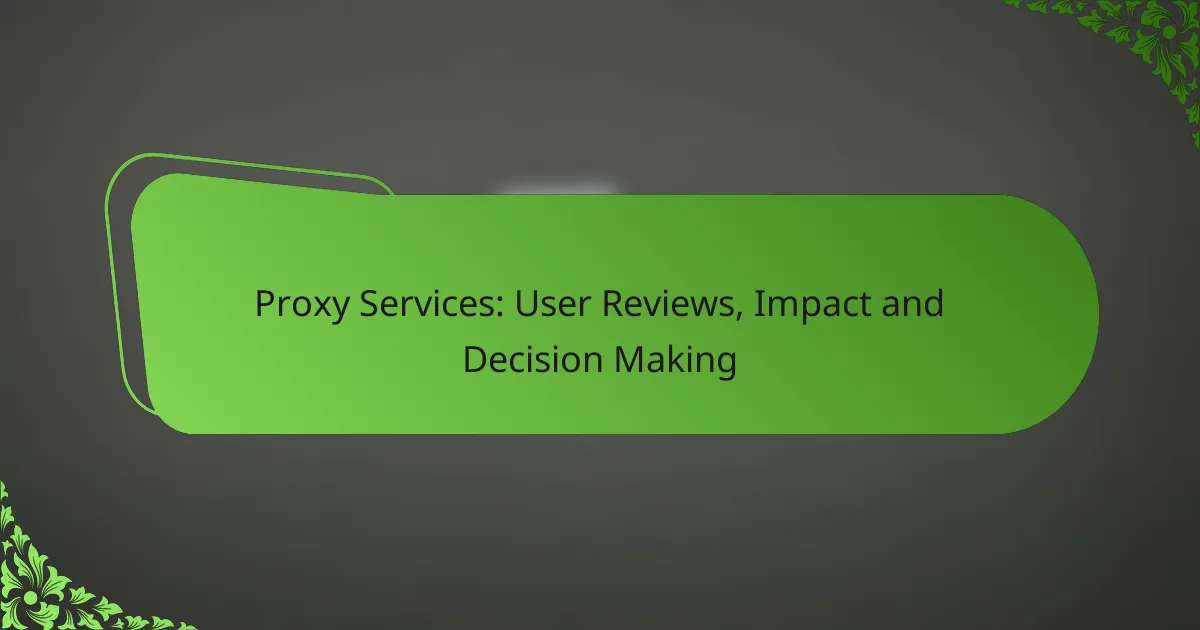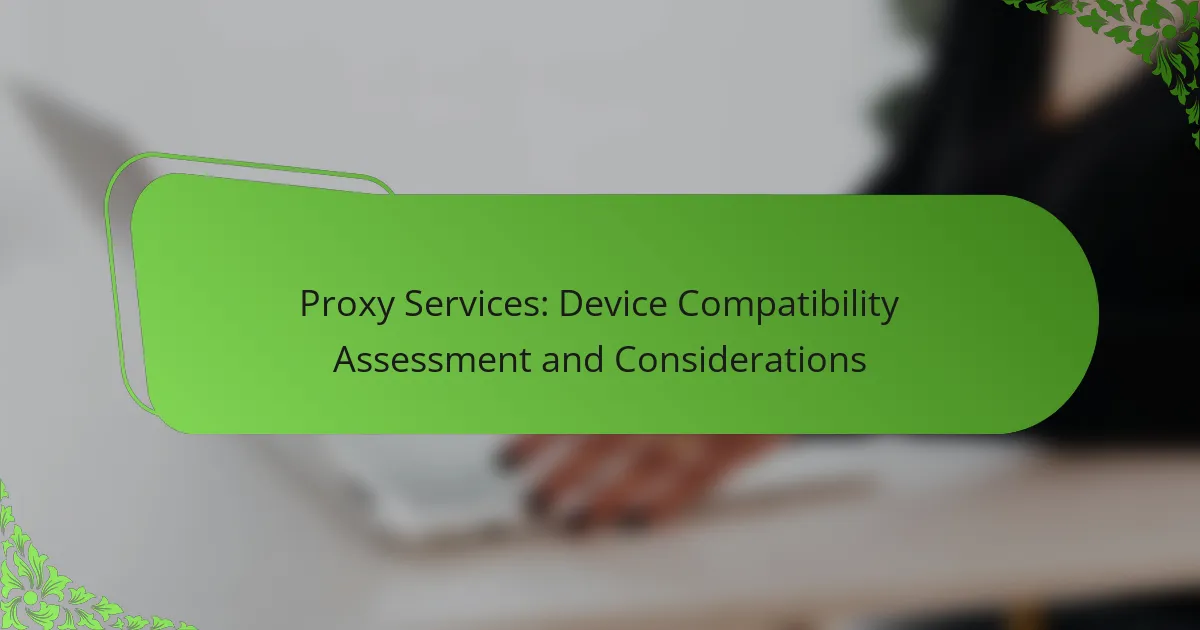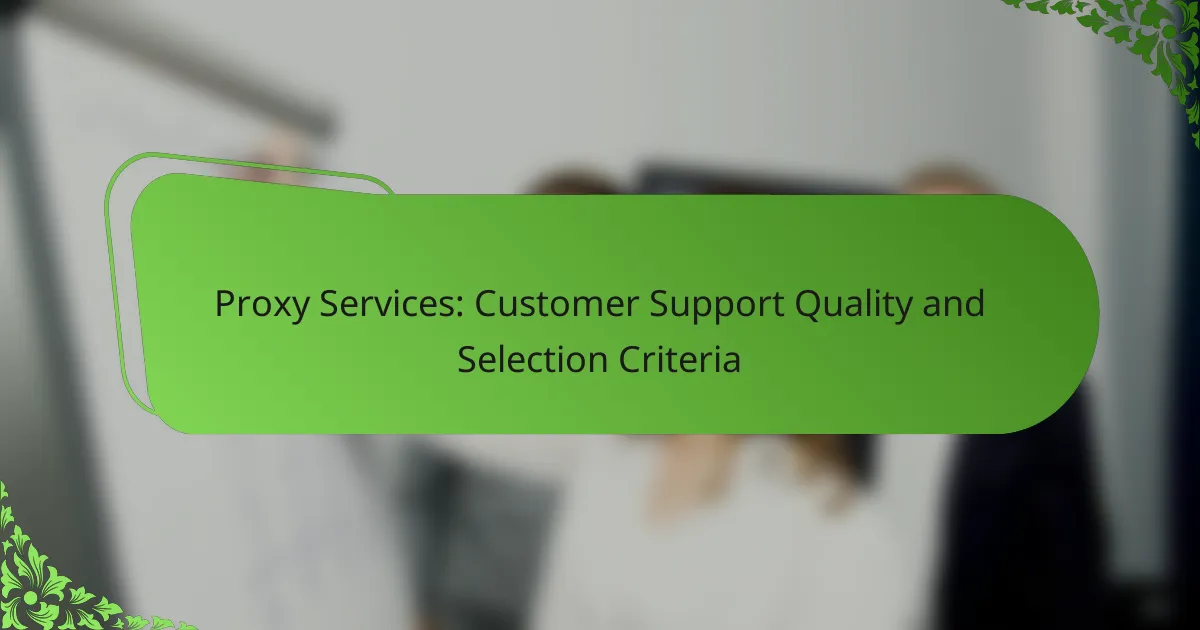Choosing the right proxy service can greatly enhance your online experience, especially for beginners seeking user-friendly options. A good proxy service should not only provide reliable performance and strong customer support but also feature an intuitive interface that simplifies secure internet access. By evaluating usability, feature accessibility, and customization options, you can find a service that meets your specific needs while ensuring privacy and flexibility.

What are the best proxy services for beginners?
The best proxy services for beginners offer user-friendly interfaces, reliable performance, and strong customer support. These services simplify the process of accessing the internet securely while providing essential features like anonymity and location flexibility.
NordVPN
NordVPN is known for its robust security features and user-friendly interface, making it an excellent choice for beginners. It offers a large network of servers across various countries, allowing users to easily switch locations for better privacy and access to geo-restricted content.
With features like automatic kill switch and DNS leak protection, NordVPN ensures a secure browsing experience. The subscription plans are reasonably priced, typically ranging from $3 to $12 per month, depending on the length of the commitment.
Smartproxy
Smartproxy specializes in residential proxies, which are ideal for tasks like web scraping and social media management. Its intuitive dashboard allows beginners to manage their proxy connections effortlessly.
Smartproxy provides access to a vast pool of IP addresses, ensuring users can rotate their IPs easily. Pricing starts around $75 for 5GB of data, making it accessible for those just starting with proxy services.
Bright Data
Bright Data, formerly known as Luminati, is a powerful proxy service that offers a wide range of options, including residential, data center, and mobile proxies. Its comprehensive features cater to both beginners and advanced users.
The platform’s user-friendly interface simplifies the process of managing proxies. However, it tends to be on the pricier side, with plans starting at approximately $300 per month, which may be a consideration for new users.
Oxylabs
Oxylabs is another strong contender in the proxy market, providing a vast network of residential and data center proxies. Its user-friendly dashboard makes it easy for beginners to navigate and utilize the service effectively.
Oxylabs is particularly known for its high success rates in web scraping tasks. Pricing is competitive, starting around $180 for 20GB of data, making it a viable option for newcomers looking to explore proxy services.
ProxyRack
ProxyRack offers a straightforward proxy service with a focus on simplicity and ease of use. It provides a variety of proxy types, including residential and data center proxies, suitable for various online activities.
With flexible pricing plans starting at around $50 per month, ProxyRack is budget-friendly for beginners. Its straightforward setup process allows users to get started quickly without technical hurdles.
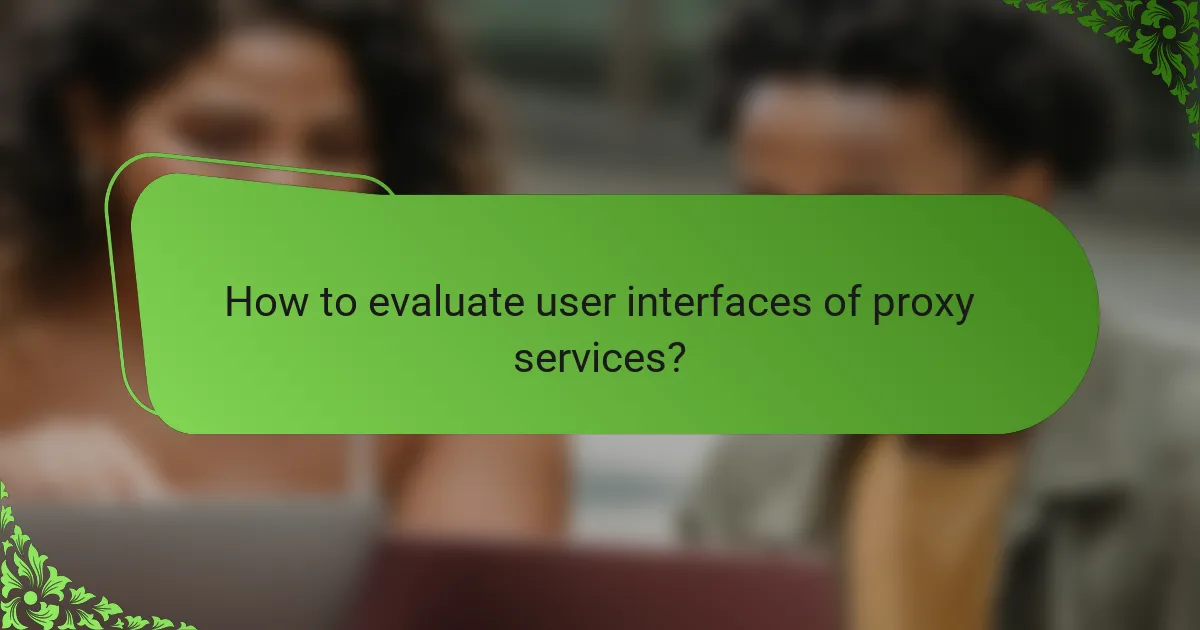
How to evaluate user interfaces of proxy services?
To evaluate user interfaces of proxy services, focus on usability, feature accessibility, customization options, and available support resources. A well-designed interface can significantly enhance your experience and efficiency when using proxy services.
Ease of use
Ease of use is crucial when selecting a proxy service, as a user-friendly interface allows for quick navigation and efficient task completion. Look for intuitive layouts, clear labeling, and straightforward workflows that minimize the learning curve.
Consider testing the interface through free trials or demos to gauge how easily you can perform essential tasks, such as switching proxies or adjusting settings. A good rule of thumb is to ensure that you can accomplish basic functions within a few clicks.
Feature accessibility
Feature accessibility refers to how easily you can find and utilize the various tools offered by a proxy service. Check if the most important features, like IP rotation, location selection, and bandwidth management, are prominently displayed and easy to access.
Evaluate whether advanced features are hidden behind multiple menus or require extensive searching. Ideally, essential functionalities should be visible and accessible without excessive navigation, allowing for a seamless user experience.
Customization options
Customization options allow users to tailor the proxy service to their specific needs. Look for services that offer adjustable settings for connection protocols, user-agent strings, and other parameters that can enhance performance and security.
Consider how much flexibility you have in configuring the service. A good proxy service should enable you to personalize your experience without overwhelming you with too many complex options.
Support resources
Support resources are vital for resolving issues and maximizing the use of a proxy service. Check for comprehensive documentation, FAQs, and tutorials that can help you troubleshoot common problems or learn about advanced features.
Additionally, assess the availability of customer support channels, such as live chat, email, or phone support. Quick and responsive support can make a significant difference, especially for beginners who may need extra assistance.
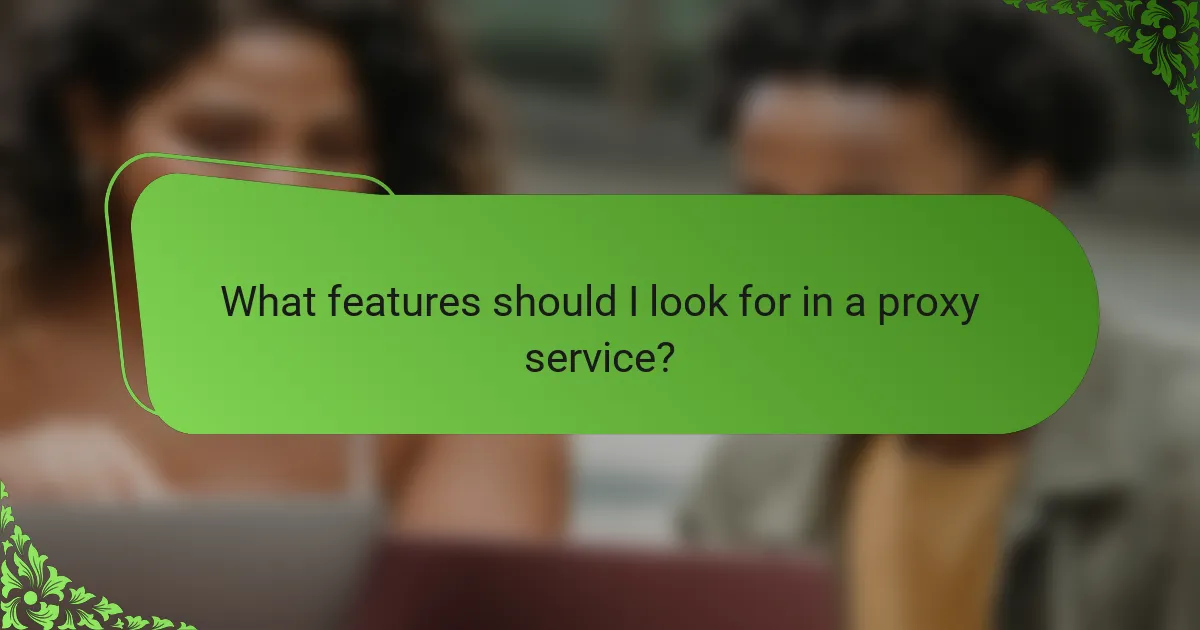
What features should I look for in a proxy service?
When selecting a proxy service, prioritize features such as IP address variety, geolocation options, connection speed, and security protocols. These elements significantly impact your browsing experience, privacy, and the effectiveness of the service for your specific needs.
IP address variety
IP address variety refers to the range of unique IP addresses a proxy service offers. A diverse pool of IPs helps prevent detection and bans when accessing websites, especially for activities like web scraping or managing multiple accounts.
Look for services that provide thousands of IP addresses across various regions. This variety allows you to switch between addresses easily, reducing the risk of being flagged by target sites.
Geolocation options
Geolocation options enable you to choose IP addresses from specific countries or regions. This feature is crucial for accessing region-restricted content or testing how websites appear in different locales.
Choose a proxy service that offers a wide selection of geolocations, including major regions like North America, Europe, and Asia. This flexibility ensures you can effectively simulate browsing from various locations.
Connection speed
Connection speed is vital for a seamless browsing experience. A fast proxy service minimizes latency, allowing for quicker page loads and smoother streaming.
When evaluating speed, look for services that offer high bandwidth and low latency, ideally in the range of low tens of milliseconds. Many providers offer speed tests, so take advantage of these to compare options before committing.
Security protocols
Security protocols protect your data and privacy while using a proxy service. Look for features like HTTPS support, encryption, and authentication methods to safeguard your information from potential threats.
Common security protocols include SOCKS5 and HTTPS, which provide varying levels of encryption and anonymity. Ensure the proxy service you choose implements robust security measures to protect your online activities from prying eyes.

How do pricing models differ among proxy services?
Pricing models for proxy services vary significantly, primarily falling into monthly subscriptions, pay-as-you-go options, and enterprise plans. Each model caters to different user needs, budget constraints, and usage patterns, making it essential to choose one that aligns with your requirements.
Monthly subscriptions
Monthly subscriptions are a popular choice for users who require consistent access to proxy services. These plans typically offer a fixed monthly fee for a set amount of bandwidth or data usage, making budgeting straightforward. Prices can range from around $10 to several hundred dollars, depending on the provider and the level of service offered.
When considering monthly subscriptions, look for features such as unlimited bandwidth, multiple locations, and customer support. Be cautious of hidden fees that may apply for exceeding data limits or additional services.
Pay-as-you-go options
Pay-as-you-go options provide flexibility for users who need proxies sporadically or for specific projects. With this model, you only pay for the data you consume, which can be ideal for testing or low-volume tasks. Rates typically start at a few cents per gigabyte, allowing users to control costs effectively.
This model is advantageous for those who want to avoid long-term commitments. However, it’s essential to monitor usage closely to prevent unexpected charges, especially if your needs fluctuate significantly.
Enterprise plans
Enterprise plans are tailored for businesses with high-volume proxy needs, often including dedicated support and customized solutions. These plans usually involve a negotiation process, resulting in pricing that reflects the specific requirements of the organization, such as bandwidth, security features, and geographical reach.
When exploring enterprise plans, consider factors like scalability, compliance with data regulations, and the ability to integrate with existing systems. Engaging with providers to understand service level agreements (SLAs) and support options is crucial for ensuring a reliable proxy service that meets business demands.
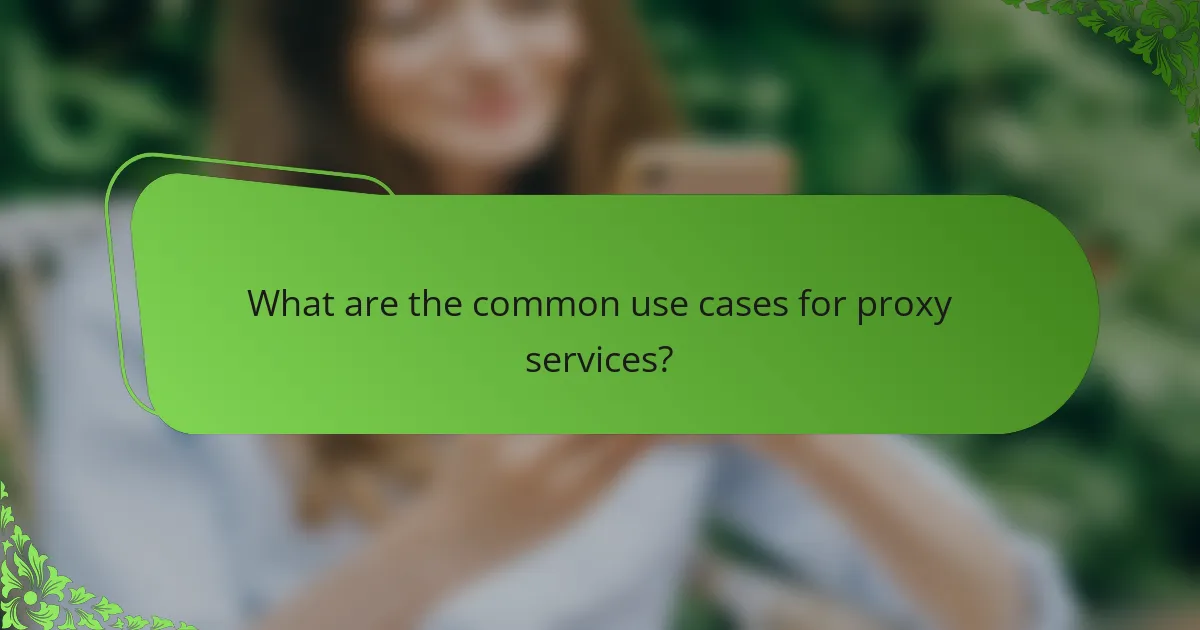
What are the common use cases for proxy services?
Proxy services are commonly used for various purposes, including enhancing online privacy, bypassing geo-restrictions, and improving data collection efficiency. They serve as intermediaries between users and the internet, allowing for secure and anonymous browsing.
Web scraping
Web scraping involves extracting data from websites, and proxy services play a crucial role in this process. By using proxies, scrapers can avoid IP bans and access data from multiple sources without being detected. This is particularly useful for gathering competitive intelligence or market research.
When engaging in web scraping, consider rotating proxies to distribute requests across different IP addresses. This helps maintain anonymity and reduces the risk of being blocked by target sites. Aim for a mix of residential and data center proxies for optimal results.
Data mining
Data mining refers to analyzing large datasets to discover patterns and insights. Proxy services facilitate data mining by enabling access to diverse data sources while protecting the user’s identity. This is essential for businesses looking to leverage big data for strategic decisions.
For effective data mining, ensure that your proxy service can handle high volumes of requests and offers fast connection speeds. Consider using proxies that allow for session persistence when dealing with sites that require logins or have complex data structures.
Ad verification
Ad verification ensures that advertisements are displayed correctly and reach the intended audience. Proxy services are used to check ad placements across different geographical locations, ensuring compliance with regional regulations and standards.
When using proxies for ad verification, select providers that offer IP addresses from various regions to accurately assess ad visibility. Regularly monitor for discrepancies in ad performance, as this can indicate issues with placement or targeting strategies.
